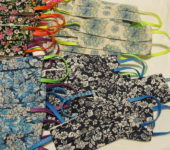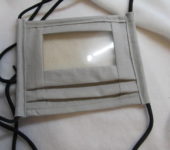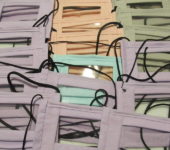Salvation Army Volunteer in Ajax/Pickering/Uxbridge Creates Masks for Deafblind Community

Conversation during the pandemic is easier for the deafblind community thanks to The Salvation Army in Ajax/Pickering/Uxbridge.
At the start of the COVID-19 shutdown in mid-March, volunteer and church member Lynda Sabourin got to work sewing masks for healthcare workers and staff at the Canadian Helen Keller Centre in Toronto who work with individuals who are deafblind, a combination of blindness and hearing loss. Communicator masks contain a plastic cut-out and are worn by staff who work with clients who need to read lips to have a conversation.
“I decided on my own that I wanted to make them,” said Lynda who is a trained seamstress. It made sense for her. “I have lots of experience working with fabric,” she added.
The project began as a conversation between her and her son Captain Jason Sabourin, The Salvation Army officer at the church. Lynda initially made the masks for local stores, and as she said, “It just kind of grew from there.” She soon branched out to nursing homes and charities, including the Canadian Helen Keller Centre.
Since the pandemic ramped up three months ago, Lynda has made approximately 1,300 masks and she says she uses only the highest quality materials.
After experimenting with a range of different types of plastic, Lynda discovered that transparency plastic is the best material to use for the masks as it doesn’t fog up. She’s also specific about fabric for the masks and only uses high-quality 100 percent cotton material rather than a cotton/polyester blend. That hasn’t been easy because of the demand for masks amid the COVID-19 pandemic, finding fabric has been a challenge. Lynda has sourced fabric from as far away as Alberta and Newfoundland and Labrador as well as London and Medford in Ontario.
Masks required by the deafblind community are made in solid pale colours to lessen any potential distraction for those who need to focus when reading lips. Lynda, however, shows her fun side by also sewing masks with light-hearted and unique images, such as hamburgers, sports logos, watermelons, bacon and floral patterns. She then washes, sterilizes and irons every mask before delivery, and each one is sent in its own sealed plastic bag to prevent contamination.
As for how long she’ll keep firing up her sewing machine, Lynda’s in for the long haul. “I’ll continue to do it until it’s not needed,” she says.
Lynda will take donations of 100 percent cotton, but monetary donations are preferred to ensure that the masks are made of the best quality materials. Donation inquiries can be made by contacting The Salvation Army at www.tsahope.com.
“I’ve committed myself to this,” says Lynda. “If you can save one person from getting sick, it’s worth it.”
By: Chris McGregor




